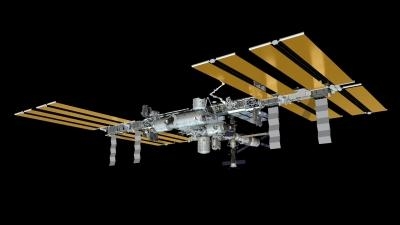Sun, Jul 12, 2015
Will Test The Effects Of Microgravity And Radiation On The Human Immune System
Anna-Sophia Boguraev from Bedford, N.Y., has been selected as the winner of the inaugural ‘Genes in Space’ competition, taking home the prize of designing one of the first autonomous DNA experiments to take place on the International Space Station (ISS). The experiment aims to test the effect of microgravity and cosmic radiation on the immune system in space. Boguraev (16) hopes to offer new avenues to enhance human health during prolonged spaceflight missions.

Genes in Space is a national contest inviting teachers and students to design experiments intended to solve real-life space exploration problems through DNA analysis. On Earth these experiments are conducted using a process called Polymerase Chain Reaction, which rapidly detects and analyzes DNA. The availability of miniPCR equipment now makes DNA studies in space possible. Organizers and sponsors devised Genes in Space as a means to inspire collaboration among students and scientists; create experimental designs testing cutting-edge hypotheses and show the possibilities and opportunities available to students pursuing careers in science, technology, engineering and mathematics.
Joining Boeing in supporting the Genes in Space competition are the Center for the Advancement of Science in Space (CASIS), Math for America (MƒA) and miniPCR. Boeing will prepare the equipment for launch; CASIS will provide a payload slot to the space station; and MƒA will serve as the education partner for the competition. Boeing is also providing equipment developed by miniPCR.
Five finalist teams, chosen from among 330 entrants, presented their proposals before a panel of scientists, educators and technologists at the ISS Research & Development conference, held July 7-9 in Boston and had miniPCR equipment donated to their educational institutions. Boguraev will have her experimental design carried out aboard the International Space Station. She will also travel to witness the experiment’s launch to the ISS.
“This is true a collaboration of industry partners to move technology and research forward while promoting STEM education and getting students excited about the possibilities of science in space,” said John Shannon, vice president and Space Launch System program manager at Boeing.
(Image from file)
More News
Performance-Based Navigation (PBN) [ICAO] Area navigation based on performance requirements for aircraft operating along an ATS route, on an instrument approach procedure or in a d>[...]
The Airplane Came To Rest Underneath A Set Of Damaged Power Distribution Lines On The Floor Of A Coulee On June 19, 2025, at 1412 mountain daylight time, a Cessna 172K airplane, N7>[...]
Aero Linx: FAA Managers Association (FAAMA) Recognized by the FAA, FAAMA is a professional association dedicated to the promotion of excellence in public service. The Association i>[...]
From 2023 (YouTube Edition): Jet Central Micro-Turbine Engines Impress Founded in the late-1990s, Mexico City-based Jet Central produces a unique and fascinating line of micro-turb>[...]
Also: ANOTHER Illegal Drone, KidVenture Educational Activities, Record Launches, TSA v Shoes The Senate confirmed Bryan Bedford to become the next Administrator of the FAA, in a ne>[...]
 ANN's Daily Aero-Term (07.10.25): Performance-Based Navigation (PBN) [ICAO]
ANN's Daily Aero-Term (07.10.25): Performance-Based Navigation (PBN) [ICAO] NTSB Prelim: Cessna 172
NTSB Prelim: Cessna 172 ANN's Daily Aero-Linx (07.10.25)
ANN's Daily Aero-Linx (07.10.25) Classic Aero-TV: The Big Business of Diminutive Powerplants
Classic Aero-TV: The Big Business of Diminutive Powerplants Airborne 07.11.25: New FAA Bos, New NASA Boss (Kinda), WB57s Over TX
Airborne 07.11.25: New FAA Bos, New NASA Boss (Kinda), WB57s Over TX



